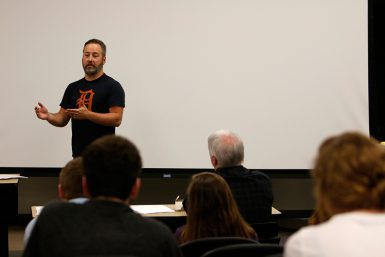Esquire’s Chris Jones shares interviewing techniques

Chris Jones, writer for Esquire and ESPN, showed students exactly how a good interview for a great story goes down by playing audio of one of his own.
Last week, Jones took his place as the latest award-winning visitor to professor of practice Tom French’s Behind the Prize class. Jones won a National Magazine Award in 2008 for “The Things that Carried Him,” an Esquire story that follows a soldier’s final return home after dying in Iraq.
Jones has covered the glamorous (Penelope Cruz, George Clooney) and the quirky (Justin Timberlake at Comic Con). But the story he shared with students was “Animals,” a 2012 story for Esquire about a man who owned 49 exotic and dangerous animals, including tigers, lions and bears, at his Zanesville, Ohio, farm. One day, the man released all of them into the wild off, then was found shot to death, his shotgun nearby.
The image in Jones’ head was clear: cops walking through a dark, rainy night in Ohio, searching for tigers, grasping guns.
Even a so-so writer “can’t mess that up,” Jones said. He himself is only a “decent writer,” he claimed. The key is in the reporting, the interviewing, the work. During class time, he used a recording of the last interview he got for that story — one that gave him some of the best pieces, he said — as a guide to discuss the art of interviewing.
The first questions are simple: what is your name, how old are you, how long have you lived here? He does that on purpose, to help relax the subject a bit, Jones said. He also prefaces most interviews by explaining that some of his questions might be weird, but to trust him that “they all matter.”
But after that, his goal is to set the scene.

Stories based on reconstruction of past scenes require this type of long, intensive interviewing. For a story like “Animals,” detail is what would sell it, he said. Often, these conversations start with another deceptively simple question: “Tell me what happened that night.”
Once the source, Sheriff Steve Blake, began talking, Jones spoke only to add conversational questions. Blake delivered, sharing a number of important details, including the sight of a tiger’s final moments.
“The thing you can do tomorrow to be a better reporter is to just shut up,” Jones said. “Let them tell their story.”
He reported “Animals” over a grueling week. The week became exponentially harder by the arrival of Chris Heath, a writer from rival magazine GQ. Both writers decided to write and report the same story in the course of the same week, arriving on the same day to the same hotel, a bizarre fluke that revealed the choices every journalist makes, Jones said.
The stories are phenomenally different. Heath’s story focuses more on “bigger” issues, such as the ownership of exotic animals, while Jones’ is “smaller,” he said, focusing more on unraveling the events of that single night.
Every reporter makes choices about which details to run and what angle to take, he added. The GQ/Esquire duke-out over Zanesville was a perfect example of it.
But every journalist must be mindful, thoughtful and careful, Jones said. Recent debacles in journalism—the Rolling Stone campus rape reporting story, for example—show just how important trust and accuracy are in the business. A journalist’s job, he added, is to decide whether or not your sources are trustworthy.
“These things live for a long time and will stick with you for a long time,” he said. “Every time you write a story, ask ‘is this as good as it can be?’”
That dedication means a journalist also must have the guts to believe in his or her own work.
“Any boxer who goes in the ring believes they are going to win,” he said. Journalists should invoke that same confidence, even in the face of hardship.

Fear is a constant part of life, he said, particularly in journalism. You are afraid of Chris Heath showing up on your story, for example, or losing your contract with one of the top men’s magazines in the country, he said. Sometimes that fear has purpose. It stops you from doing stupid things that will hurt you. But it also stops you from doing “awesome things.”
“I can promise that if you are legit good at this and not afraid, doors will open,” he said.
Students appreciated his sly sense of humor and kind words.
“I’ve read a lot of his stories. And now meeting him in person, it was just really inspirational,” said Jamie Zega, freshman Ernie Pyle Scholar. “Not letting fear getting in the way: I feel that’s going to ring with me for a while.”
More:
- Read “Animals,” “The Things that Carried Him,” and Jones’ other stories at Esquire.

